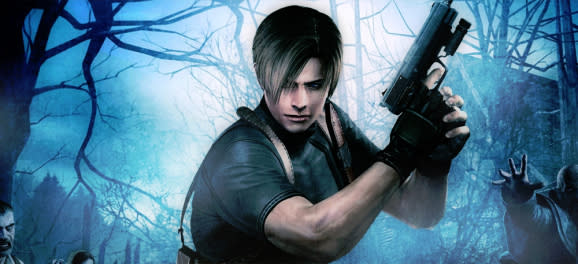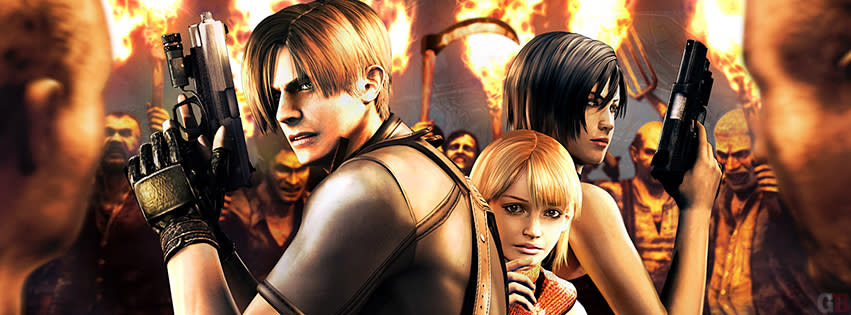10 years later, Resident Evil 4 still influences the industry

FEATURE:
It’s rare that the fourth game in a series is its most influential installment, but that’s certainly the case with Resident Evil.
Resident Evil 4 came out for the Nintendo GameCube on Jan. 11, 2005. Yup, that’s 10 years ago today. And despite coming out a decade ago, the industry still feels its influence.
It’s one of Capcom’s best-rated games ever. It won numerous Game of the Year awards in 2005. It practically killed one genre while revitalizing another. Resident Evil 4 left quite a legacy.
Above: Spanish villagers. Why did it have to be Spanish villagers?
Image Credit: GamesBeat
Over-the-shoulder
While the previous Resident Evils were survival-horror games with fixed camera angles, RE4 put more of an emphasis on action while putting the camera behind the character’s shoulder. Not only did it buck franchise tradition, but it also reinvented the third-person shooter.
That over-the-should angle is now the standard. You’ll find it in Gears of War, Uncharted, Grand Theft Auto V, Mass Effect, The Last of Us, and much more. Even action games like the Batman: Arkham series use an over-the-shoulder camera. You can trace that influence back to Resident Evil 4. Playing a third-person shooter that came out before it just feels weird.
Resident Evil, and survival horror, changed forever
While Resident Evil 4 made waves in the industry, it was a tsunami for its own series. As stated earlier, the previous Resident Evil games were more about survival than action. Ammo was scarce, and a single zombie could be a huge threat. Hell, even saving your game was a luxury that required an in-game item to perform.
Above: No, it’s not called 4 Resident Evil.
Image Credit: Capcom
Resident Evil 4 did away with all of that. Ammo was usually easy enough to find, especially with the help of vendors. The main enemies weren’t even zombies. Instead, you fought the Los Ganados, which — granted — were a lot like the undead, but they had a way of replacing blown-off heads with bug-like appendages.
Usually, making such a big departure could be disastrous for an established franchise, but fans largely embraced Resident Evil 4’s changes. It helped that Capcom’s execution was nearly flawless. While it was definitely a faster-paced game, RE4 was still tense and creepy. It was just also more exciting.
Of course, this success had some large consequences. Further sequels had a hard time matching up to RE4’s high standards. Resident Evil 5, which came out four years later, was seen as inferior by most critics and fans. While RE4 earned plenty of Game of the Year awards and other accolades, RE5 instead settled for review scores in the mid-80s range. Those are great — but not fantastic.
Things were worse for Resident Evil 6, which received more mixed reviews than positive ones. Clearly, Resident Evil 4 had cast a large, umbrella-shaped shadow on the series.
An early example of the remastering craze
We’re living in an age of video game remastering. Grand Theft Auto V, Tomb Raider, Grim Fandango, and others are seeing new, spruced-up releases on PlayStation 4, Xbox One, and other systems. While this is becoming the norm, Resident Evil 4 was again ahead of zombie-crawling pack.
Above: Resident Evil 4 in HD.
Image Credit: Steam
While originally a GameCube exclusive, Capcom would later release RE4 on the PlayStation 2 in Oct. 2005. Yup, the same year as the GameCube release. But the PS2 version wasn’t a mere port. It featured a new side-scenario featuring the Ada Wong character.
In 2007, RE4 would get a release on the Wii, complete with support for that system’s motion-tracking controls. In 2011, Resident Evil 4 would see an HD remastering for the PlayStation 4 and Xbox 360 (and later PC). You know that a game is pretty popular when a company can get away with selling it again this many times.
The next 10 years
Resident Evil 4’s legacy is complex. It’s the father of the modern third-person shooter, but also the killer of the classic survival-horror genre. However, those kinds of games might be making a comeback. Last year, Shinji Mikami (the man who directed the original Resident Evil and RE4), released The Evil Within, a horror game that brings horror back to its slower, less action-focused days. Even the Resident Evil series is returning to its roots with the Revelations games, which once again focus more on ammo-conservation than headshots.
Still, whatever narrative you choose, Resident Evil 4 has clearly left its mark on the gaming industry. We’ll likely still its imprint in another 10 years.
Mobile developer or publisher? VentureBeat is studying mobile marketing automation. Fill out our 5-minute survey, and we'll share the data with you.




